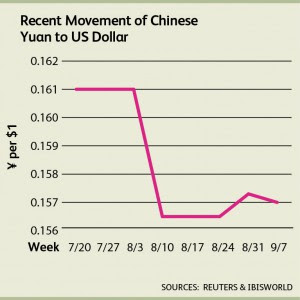By Sean Windle
IBISWorld expects that buyers of highly commoditized goods will reap the most benefit from the yuan’s depreciation.

China sent shockwaves throughout the global economy August 11 when it announced a massive devaluation of its currency. Chinese monetary authorities devalued the yuan 1.9% against the dollar, the largest one-day decline in more than two decades. The move, which was followed up by several more devaluations, has prompted a rash of US stock selloffs amid fears of flagging growth in the world’s second-largest economy. But while the yuan’s depreciation has rattled investors, it may prove a boon for US buyers.
A devalued yuan will make Chinese goods more competitively priced in the global market, particularly in the United States, which consumes about one-fifth of China’s exports. With the US dollar surging and the recent drop of the yuan, US buyers are sourcing goods from China
The influx of additional Chinese imports to the United States will put added pressure on domestic suppliers to cut costs and reduce prices to compete. Buyers can leverage this increased competition to negotiate lower prices and more favorable purchasing terms. The yuan’s devaluation will also extend competition to other exporting countries in the region, such as South Korea, Thailand and Malaysia, which compete with China for US business. More competitively priced Chinese goods may prompt these and other Asian-Pacific countries to devalue their currencies in a race to the bottom to lure US buyers. At the very least, suppliers in these countries will be forced to reduce costs and lower their prices to remain competitive, giving US buyers more leverage when sourcing foreign-made goods.will be able to purchase more for their dollar.
IBISWorld expects that buyers of highly commoditized goods will reap the most benefit from the yuan’s depreciation because these products are already heavily imported from China, and tend to be indistinguishable from their US-made counterparts in terms of quality and uniqueness. These goods include electronic components, such as solar panels, LEDs and circuit boards, and a wide range of different metal and plastic-based products, like industrial machines, engines, medical equipment and packaging materials. By sourcing more goods from China, US buyers can take advantage of the yuan’s recent depreciation and secure significant cost savings.










Leave A Comment